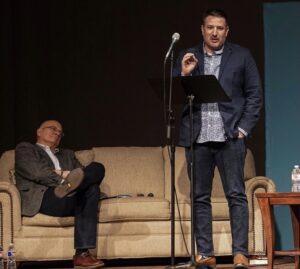
I had not heard of Tim Keller at the point of my “gospel wakefulness.” It was sometime in 2005 when the Lord broke through my depression and thoughts of suicide and arrested my attention to the glory of Jesus in a way I’d never experienced before. Everything changed for me, but it was not the result of someone pointing me to a gospelly website or taking me to a gospelly conference. Those things didn’t really exist yet.
But they would soon enough, and as I was trying, like Bambi on the ice, to get my feet under me with a “new” paradigm for life and ministry, someone down the road said, “You have to listen to Tim Keller.”
I’m pretty sure it was Steve McCoy. This was in the heyday of the blogosphere, which was a smallish pond back then, with a few of us splashing around in it quite dramatically. A couple of years out of my grace awakening, I was leading a young adult ministry at an attractional megachurch west of Nashville, Tennessee and by God’s kind providence had connected online with a handful of fellow Gen-Xer’s also trying to figure out how to do “this gospel stuff” in pragmatic, consumeristic, or otherwise “traditional” church spaces. We weren’t buying what the emergent church was selling. Steve had a page on his blog compiling all kinds of resources, written and audio from this Presbyterian guy in New York City. If you wanted to be “gospel-centered,” Tim Keller was Yoda.
Despite being a prolific blogger, I was (and am) a techno-moron, so I didn’t know how to listen to podcasts or other online audio on an iPod or anything like that. Somebody — my brother? my friend Bill? I’m not sure — burned me a CD of Keller’s talk at the inaugural Gospel Coalition Conference (2007) called “What is Gospel-Centered Ministry?” A couple of different edits of this talk have appeared online over the last 16 years, and there was not video available back when I first heard it. The version I listened to included the introduction of Keller, in which it was said he was becoming “a household name.” In response, in his opening remarks, Keller made some kind of dad-joke about a husband and wife being in the kitchen and things being mentioned like “salt . . . cumin . . . Tim Keller.” (That bit has been excised from the existing audio now available.)
It was a lame joke but showed his awkwardness with the idea of “celebrity,” I think. And this was 2007. He was not even close to the celebrity he would become.
I wore that CD out. I still revisit that talk, probably every 18 months or so. In 2007 it was like the opposite effect Pandora’s Box for ministry. You opened it up, and a million blessings were unleashed into the world. Jonathan Edwards and preaching to the heart? It’s in that talk. Law and gospel distinction? It’s in that talk. Idolatry as the root of every sin? It’s in that talk. The pastoral counseling application of the gospel “on audio” but not “on video?” It’s in that talk.
The now-famous “Jesus is the true and better . . .?” It’s in that talk.
That conference talk became a kind of Rosetta stone for me, and I’m sure I ripped off at least a dozen quotables from it for my own work. More importantly, it gave me a framework for gospel-centered ministry that nobody had given me. I grew up in a vanilla SBC church, later cutting my ministry teeth in the “contemporary service” climate and finding what little training anybody thought to offer in the midst of the seeker church phenomenon. I had come to Reformed soteriology before that, independent of my church, thanks to the influence of some Christian friends, but my ecclesiology was terrible, my hermeneutic was self-centered, and my philosophy of ministry was shallow. With the rising influence of the gospel-centered ecosystem, that was beginning to change.
I read a lot of Keller white papers on gospel ministry and church planting. I must admit that in the planting of a church in Nashville, I was heavily influenced by “the vibe” of Mark Driscoll, but all the stuff that had hand-holds came from Keller. When the man himself came to Nashville to speak one evening at Christ Presbyterian Church, a few of us from the church planting team were in attendance. And we made the drive to Chicago in 2009 for the second Gospel Coalition Conference.
In that same year, I moved from suburban Nashville to rural Vermont, assuming the pastorate of a 200-plus year old church in a very little town. By that time, I was neck deep in Kellerisms. The Prodigal God had recently released, and having personally experienced the “prodigal grace” of Christ in my own life, I was further inspired to ladle grace on thick with my new congregation.
We used his Gospel in Life study in our small groups. When The Reason for God came out, some in my flock were really excited. Christians are a distinct minority in irreligious Vermont, and my people had friends who were not only unbelievers, but in some respects hostile to the exclusivist ideas of Christian theism. Several of us read the book. I bought the video series and we used it in a small group. We watched weekly as Keller sat with a small group of his own made up of skeptics and non-Christians, listening to their questions and navigating their doubts and criticisms. What did it teach us about Keller’s approach to evangelism and apologetics? First, to listen as one who’s genuinely interested in the soul of another person. Secondly, to always bring your response back to Jesus.
As the years went on, I noticed as more and more of my gospelly tribesmen seemed to grow disillusioned with the stuff. Scandal after scandal might do that to you. A waning interest among publishers and marketers might do that too. Just getting older can do that too. We lose the energy of our youth and its attendant infatuations. I would probably be among them if it weren’t for what happened to me in that Nashville guest bedroom in 2005.
So I kept on keepin’ on. And what I discovered is that those who also kept in step with the truth of gospel-centrality tended to be those who had not just adopted it as a ministry paradigm or a cultural movement but who had been in some sense hijacked by it before they knew about paradigms or movements! Keller’s “conversion” to gospel-centrality was similar. So while some of the other leading voices gradually changed their tunes, shifting emphases with the shifting times, he was still holding the line for grace over law. There is almost nothing in that 2007 talk that he wasn’t emphasizing ten years prior and that he wasn’t emphasizing til the day he died.
I only got to meet Keller two or three times. The only meeting of any substance was a few years ago in Memphis where we were speaking at the same event. Mark Dever and a couple of others were there too. We’d each been given ten minutes or so to give a talk on an assigned topic. The stage was arranged for us to sit on a couple of couches during the other presentations, and Keller and I shared a couch. As he got up to speak — without notes, intelligently, with authority and great insight — I sat behind him and thought, “I can’t believe I’m here.” If you had told me in 2007 I’d be sharing a stage with Yoda, I wouldn’t have believed you. It was humbling. And terrifying. Because I still had to take my turn.
There’s a great photo someone took of my standing at the lectern giving my talk, Keller seated on the couch behind me, staring at the side of my head with a look of . . . what? It’s hard to say. It’s amusement, I think. My read on the image is that it was yet another moment, among many in his life, I’m sure, where Keller had to listen to someone regurgitate several years’ worth of his own material. He might have been seated on a couch behind me, but I was standing on his shoulders.
 He may have entered into his reward, but I’ll still be standing on his shoulders, riding his gospelly coattails, and recycling all his best stuff forever and ever, Amen.
He may have entered into his reward, but I’ll still be standing on his shoulders, riding his gospelly coattails, and recycling all his best stuff forever and ever, Amen.
Earlier at the event I had lunch in a break room with Keller and a couple of men who had traveled with him. It wasn’t a deep conversation. He asked me about my role at Midwestern Seminary and about my family. It wasn’t a long conversation. A little later, we found ourselves standing in a darkened hallway outside the room, I think preparing for mic checks or something. I don’t remember all the details about that conversation either, but I do remember he asked me about why people online are so mean. I’m sure he asked it in a more intelligent way, but that was the gist of it. (This actually isn’t the first time an elder statesman in the gospel-centered tribe has asked me this question.) I don’t know exactly what I said in response, but it amounted to “I don’t know.” And that was basically it.
I had nothing of substance to offer the man who had given me over many years nothing but substance!
I’m sure whatever answers he had come up with to the question would be better than mine anyway. And when I find out what they are, I’ll rip those off too. I don’t think he’ll mind. I imagine him now looking down from that big couch in the sky with a pleasant bemusement on his face. The Kellerisms have reached the bloodstream, for heaven’s sake.
What the man has crafted for so many of us is a framework and a vocabulary, a translatable Reformation theology that fits any context. Like Tolkien’s Elvish, he created a language for us to speak, and not just for kicks, but to give real expression to the real work of grace in our real lives.
In some ways, the real measure of a great leader’s legacy is not in his production of books and sermons or in the planting of a big church or the building of some great organizations or of anything like that. It’s likely in the way the impression of him, the influence of him shapes those left behind. What I mean is, plenty of people like The Prodigal God or The Reason for God, but plenty more are saying things like “The gospel isn’t the ABC’s of the Christian life, but the A to Z” without even knowing they’re quoting Tim Keller. And there are multiple dozen more quotables just like that now just existing in the evangelical aether. Because of Keller. He has left behind great works, yes, but he’s also left behind thousands of happy, unwitting plagiarists, and as a man who cared more about the gospel than his own reputation, I think he’d be perfectly fine with that.

